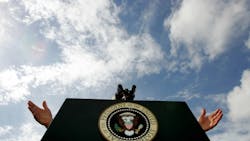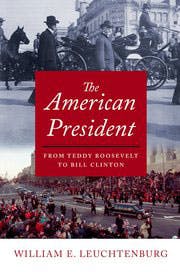Eleven months from now, barring a return of hanging ballot chads and seemingly endless court challenges, voters in the United States will have chosen a new president. A process begun in the politics of more than two centuries ago again will have worked. Why should anyone care? Because, for better and for worse, American presidents do matter.
The presidency has mattered from before the beginning of American constitutional government. The signers of the Declaration of Independence and the drafters of the Constitution were finished with monarchs and determined not to re-create the mistake. A result was a limited tri-partite national government. Yet, in the first half of the nineteenth century, Thomas Jefferson challenged that design with the Louisiana Purchase, Andrew Jackson with the forced relocation of Native Americans, and James Polk with western land expansion. Just past mid-century Abraham Lincoln exercised extraordinary powers in an effort to hold the then-union of 36 states together. At the end of the century, Theodore Roosevelt, successor to the assassinated William McKinley, expanded the powers of the president to suit his ambitions and sizeable ego and (what he saw as) the needs of a more economically diverse and more influential nation.
It is with Theodore Roosevelt that the distinguished historian William E. Leuchtenburg
in The American President (Oxford University Press, 2015), a particularly insightful and remarkably detailed book, begins his analysis of the significance of American chief executives from (Teddy) Roosevelt through Bill Clinton. Presidents who, whether rightly labeled “imperial” or not, unmistakably involved themselves to greater and lesser degrees in the governing of a maturing nation.
In choosing a president of the United States—in this year and all years—the great American challenge is for each would-be voter and interested citizen to take a lead from Leuchtenburg and be as analytically thorough as he or she can in vetting those who would be president. Ignorance, studied or otherwise, of candidates as persons, of the content of their records, of the tone of their rhetoric, and of the substance (or lack thereof) of their principles is neither a rationally nor emotionally satisfying basis for choosing a president of the United States.
Information of, for, and about presidential candidates is aplenty. Perhaps, for some, to the point of too much information. Particularly with the sophistication of social media and the immediacy of the Internet, direct and indirect access to candidates is without precedent.
The ways and means for informed opinions and informed votes exist. Informed opinions and informed votes do matter, for presidents of the United States matter.
This is another of a series of occasional essay by John S. McClenahen, an award-winning writer and photographer who for four decades covered international economics, public policy, and management principles for IndustryWeek.
About the Author
John McClenahen
Former Senior Editor, IndustryWeek
John S. McClenahen, is an occasional essayist on the Web site of IndustryWeek, the executive management publication from which he retired in 2006. He began his journalism career as a broadcast journalist at Westinghouse Broadcasting’s KYW in Cleveland, Ohio. In May 1967, he joined Penton Media Inc. in Cleveland and in September 1967 was transferred to Washington, DC, the base from which for nearly 40 years he wrote primarily about national and international economics and politics, and corporate social responsibility.
McClenahen, a native of Ohio now residing in Maryland, is an award-winning writer and photographer. He is the author of three books of poetry, most recently An Unexpected Poet (2013), and several books of photographs, including Black, White, and Shades of Grey (2014). He also is the author of a children’s book, Henry at His Beach (2014).
His photograph “Provincetown: Fog Rising 2004” was selected for the Smithsonian Institution’s 2011 juried exhibition Artists at Work and displayed in the S. Dillon Ripley Center at the Smithsonian Institution in Washington, D.C., from June until October 2011. Five of his photographs are in the collection of St. Lawrence University and displayed on campus in Canton, New York.
John McClenahen’s essay “Incorporating America: Whitman in Context” was designated one of the five best works published in The Journal of Graduate Liberal Studies during the twelve-year editorship of R. Barry Leavis of Rollins College. John McClenahen’s several journalism prizes include the coveted Jesse H. Neal Award. He also is the author of the commemorative poem “Upon 50 Years,” celebrating the fiftieth anniversary of the founding of Wolfson College Cambridge, and appearing in “The Wolfson Review.”
John McClenahen received a B.A. (English with a minor in government) from St. Lawrence University, an M.A., (English) from Western Reserve University, and a Master of Arts in Liberal Studies from Georgetown University, where he also pursued doctoral studies. At St. Lawrence University, he was elected to academic honor societies in English and government and to Omicron Delta Kappa, the University’s highest undergraduate honor. John McClenahen was a participant in the 32nd Annual Wharton Seminars for Journalists at the Wharton School at the University of Pennsylvania in Philadelphia. During the Easter Term of the 1986 academic year, John McClenahen was the first American to hold a prestigious Press Fellowship at Wolfson College, Cambridge, in the United Kingdom.
John McClenahen has served on the Editorial Board of Confluence: The Journal of Graduate Liberal Studies and was co-founder and first editor of Liberal Studies at Georgetown. He has been a volunteer researcher on the William Steinway Diary Project at the Smithsonian Institution, Washington, D.C., and has been an assistant professorial lecturer at The George Washington University in Washington, D.C.

